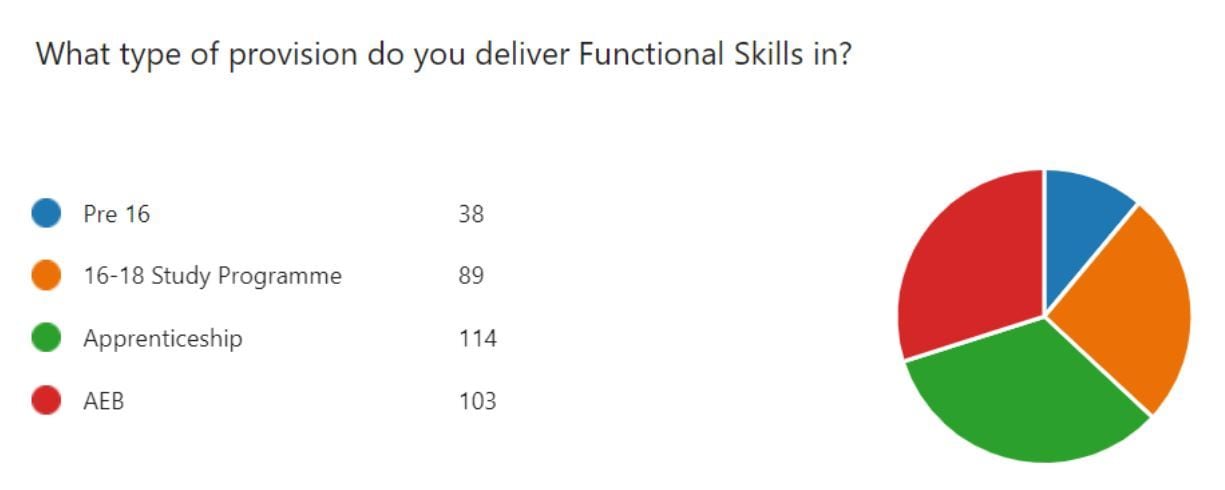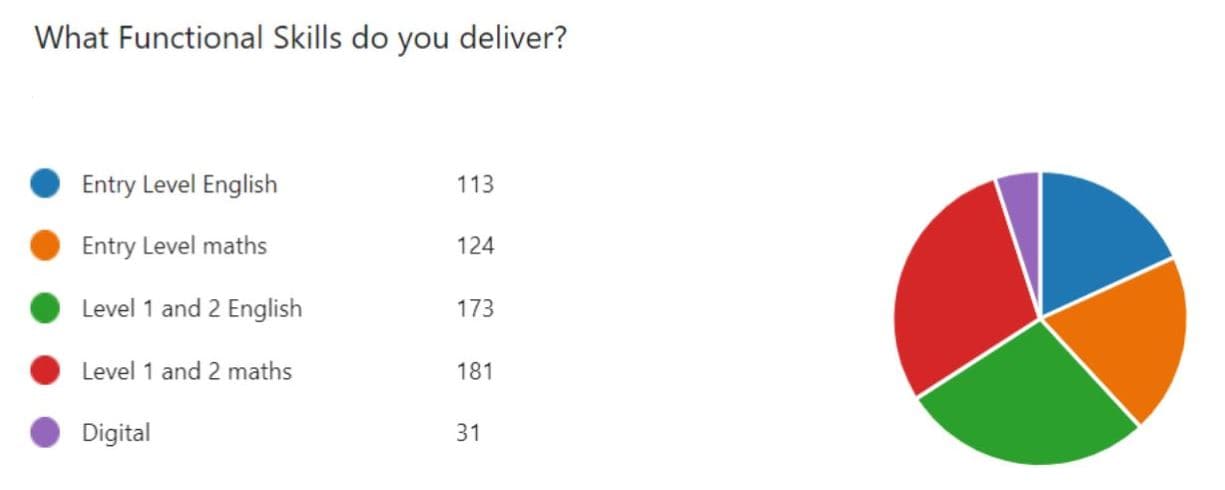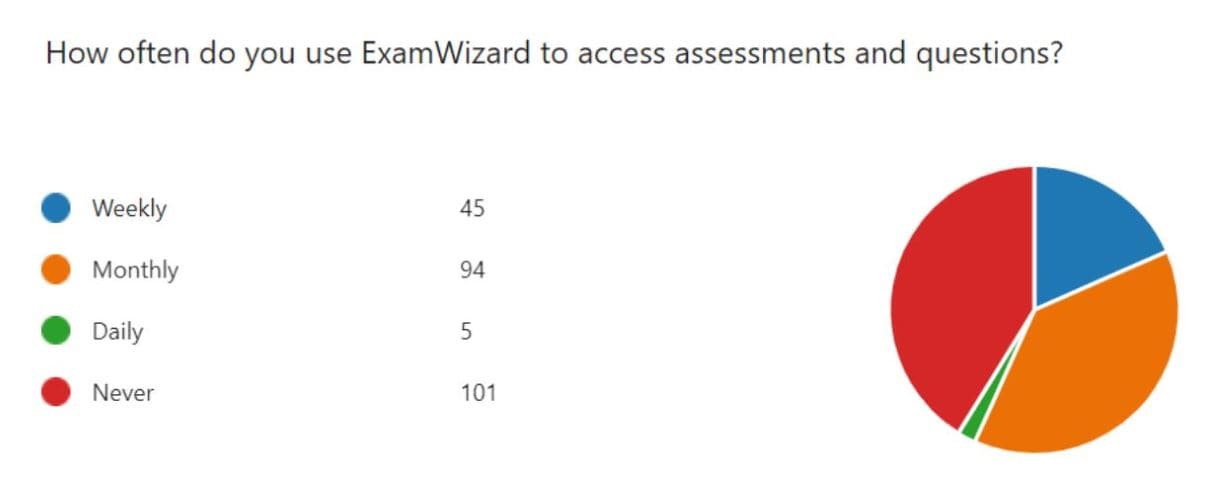Pearson Functional Skills: Retired past paper usage
Hello, Happy New Year and welcome to the Pearson Functional Skills blog for January 2024. This month we will be looking at the outcomes of Pearson’s research into the usage of our retired past papers for Functional Skills.
In total, this research received 245 responses, a record for any research I have carried out. We can see from the chart below that the responses were evenly spread across the different types of provisions that Functional Skills is used in.

Similarly, we can see that the different Functional Skills and levels were equally represented. It is nice to see that our new Digital Functional Skills offer was represented too.

How often are Pearson’s Functional Skills past papers being used?
The quick answer to this question is often. Some tutors were using them every lesson, often just individual questions from ExamWizard, while others had policy about how many papers a learner needed to sit prior to taking a live assessment. In every case, everyone saw a great deal of value in having access to as many papers as possible. As tutors stated:
Having so many is a point of difference between Edexcel and other awarding bodies.
The retired papers are an essential part of my teaching/learning experience. Learners often need to see what has come before them, to be able to gauge what is needed in order to pass.
How many past papers are needed?
As with the previous question, there were a range of answers. The consensus was that ten was the maximum needed, but there would be a benefit from refreshing the selection on a regular basis. One other concern was ensuring that learners could not access papers that providers planned to use for mocks. With both in mind, we have looked at our approach to releasing past papers for Level 1 and 2. In April we will be releasing set 10 of our past papers. This will bring us up to the ten papers at the top of what people requested. From the start of the new academic year, we will continue releasing new papers in September and December. These papers will be padlocked on the webpage for that academic year. Tutors can still access them with an Edexcelonline account, but learners will not be able to. These papers can then be used for mock assessments, safe in the knowledge that learners cannot access the answers in advance. These papers will be updated every year and those from the previous year will remain on the website without padlock and will be added to ExamWizard.
What are Pearson’s Functional Skills past papers used for?
There were a wide range of answers to this question, and it is obvious that Functional Skills past papers are used throughout the learning process. Some providers use the papers from the start of delivery, using one as a baseline or diagnostic assessment. While they are not necessarily designed for this, it is an interesting approach and could allow providers to assess gaps in learners’ knowledge and their ability to access the papers. We do need to remember that the maths and digital papers do not cover the full curriculum and so more does need to be done by providers to get a full picture of a learner’s needs. That being said, using them as a baseline does allow a provider to get a get a good understanding of how a learner approaches problem-solving in maths. I would recommend a follow up conversation with each learner to ascertain where their issues lie. The results, in themselves, may not give you a full and accurate picture.
Outside of baseline/diagnostic purposes, the main uses of the past papers are:
- As a formal mock assessment done under assessment conditions
- To provide example questions on a particular topic (often used in conjunction with ExamWizard)
- To build confidence in learners
Here are some examples of their use from the research:
I always feel they [the learners] need to be comfortable and confident opening and tackling a real exam paper, including understanding the structure and style and understanding mark schemes to some extent (e.g. why method marks are important [in maths]).
We use the retired assessments on Exam Wizard to create worksheets to use in lessons to familiarise apprentices with exam questions throughout their learner journey.
We use full or part papers as a tracking progress tool every 6 weeks. The aim is for learners to improve against their own scores over time, not to pass as such, since they use these before they have covered some of the skills in class. Initially we start with part of a paper to not be too scary. Besides providing us with a tracking tool, it also introduces learners to the format and language of test papers early on and takes away some of the exam fear.
[We] use L1 for checking for skills gaps for L2 learners. Use them to introduce problem solving and link learning to using that learning. Show learners examples of questions for each topic.
To reduce the exam stress by giving the learners an idea of what to expect in the actual exam
I also take questions/tasks from them and adapt/develop into classroom tasks. For example, L2 Q13 in the reading paper - use the texts and adapt the question so that learners can find all of the similarities between the texts (as identified in the mark scheme). This is also useful for exam technique when asking learners to consider which specific similarities the question has asked for examples of, rather than just lots of similarities across a range of points made in the texts.
L2 Q10 in the reading paper, [I] use the text and ask learners to find examples of given language techniques, with examples from the texts, or ask learners to find as many language techniques as they can from the text and provide examples.
I often use the writing tasks as homework tasks and to allow learners experience of composing different types of text - also useful as exam technique for the writing paper.
Practice questions. Although I tend to change the numbers so I can use them in different ways. I also use them for question ideas and structures.
Discussions of the language of maths needed to break down the methodology of the questions.
Highlighting common errors made during exams.
Walking, talking mocks.
We can see a plethora of uses here, not just as mocks. They are a valuable resource to show learners what to expect and are a useful tool for practicing maths and English techniques in context. I talk about a version of walking, talking mocks in a podcast episode - All about Functional Skills in Post-16 - I did with the English and maths booth and there is a full description of how to use this technique here: Mini Walking Talking Mocks: what are they?
Corinne Jackson, Advanced Practitioner and English Lecturer at Hopwood Hall College describes how she uses walking, talking mocks:
The 'walking, talking mocks' are a type of mock assessment whereby I walk and talk the learners through the assessment, question by question. I offer suggestions on how to approach specific questions, how to be successful, how to manage time, what pitfalls to avoid, exemplar answers and then give the learners a set time to complete the sections of the paper.
ExamWizard
ExamWizard is Pearson’s tool that allows you to access past papers (as well as them being on the website) and create your own resources based on coverage and range points. It is available for Entry Level and Level 1 and 2 maths and English and will be shortly available for Digital. One teacher went so far as to say “examWizard is fantastic”. That said, the feedback on usage was a little disappointing with many saying they never used it. There were some caveats in the comments, but for me that is a lot of people not taking full advantage of this amazing support tool.

To find out more about examWizard for Functional Skills, you can watch our webinar examWizard webinar | YouTube or visit our dedicated webpage examWizard | Overview.
I will finish this section with one final quote from the research.
[I] especially like the functionality of examWizard as it can create bespoke work for students depending on their needs. Also, examWizard allows you to create work that progresses in difficulty through a topic as it is so easy to move questions around once you have chosen them.
Conclusions
Overall, past papers are seen as a key tool to support learners and their learning. It is not about teaching to the assessment; it is about ensuring that the learners are fully prepared for the assessments and the style of questions they might be asked.